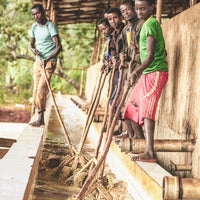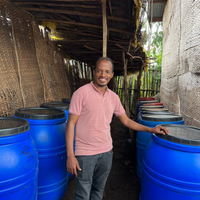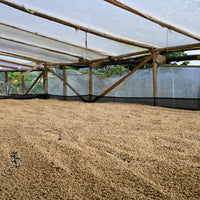Origin: Mexico
Region: Soconusco Region, Chiapas
Sub region: Motozintla Municipality
Farmer: Teddy Esteve
Altitude: 900 - 1300 meters above sea level
Variety: Starmaya (Marsallesa x wild Ethiopian/Sudanese natural mutant)
Process: Natural
Tasting Notes: Rounded and sweet with notes of lavender, orange and plum.
Owned by Teddy Esteve, San Antonio is a 400-hectare estate located in the Sconousco region, of which 20 hectares are set aside for conservation, encouraging natural fauna and wildlife in the region. Purchased by Teddy in 2009, San Antonio sits on the borders Guatemala, wedged between the Sierra Madre de Chiapas Mountains and the Pacific Ocean. With an annual rainfall averaging 4300mm and humidity typically ranging between 85% and 99%, fermenting and
drying coffee cherry without the presence of bacteria and fungus is a challenge, one that Teddy and his team have risen to the task and is producing high quality specialty driven coffee.
In 2013, the San Antonio Farm was severely affected by coffee leaf rust, resulting in a large-scale replanting of the farm. Seven years on and with the help of Teddy’s team of experts, San Antonio is once again producing some great coffees. Currently at San Antonio, fertilisers are created using the results of in-depth soil analysis, providing each tree with the exact percentage of nutrients needed. Pruning is only conducted intermittently, addressing mainly non-productive areas. Teddy populates his land with a mix of Marsellesa (48%), Starmaya (15%), other F1 Hybrids (27%), and even some specialty Robusta
(10%), varietals are selected and planted for their resistance, cup quality and commercial yield viability Teddy’s primary focus for San Antonio is his commitment to sustainability, for both the environment and the wellbeing of his 100 to 450 (high season) staff. Regular investment in infrastructure means that Teddy is always looking to better both his crop and the work environment for his team. San Antonio’s work with Fundación C.a.F.E has meant that all staff now have access to learning materials, helping improve the literacy rate of the migrating pickers
who often travel north from Guatemala for work. Workers also receive wages above Mexico’s established minimum wage, with a bonus structure set to reward productivity.
For processing at San Antonio, lots are separated by variety. Once they have been selectively handpicked, coffee cherry is delivered to the mill. The cherry is initially cleaned and floated in freshwater to remove any floaters known as ‘vanos’. Next, the coffee cherry is laid on african style raised beds to dry over 5 days. Here, thermometers are used to control ambient temperatures and relative humidity, Coffees are then put into Mechanical dryers and are slowly dried till moisture content of below 12% is recorded, the coffee cherry is packed and driven to the mill some 900 kms away in Veracruz on the other side of Mexico; selected due to its proximity to the export port.







